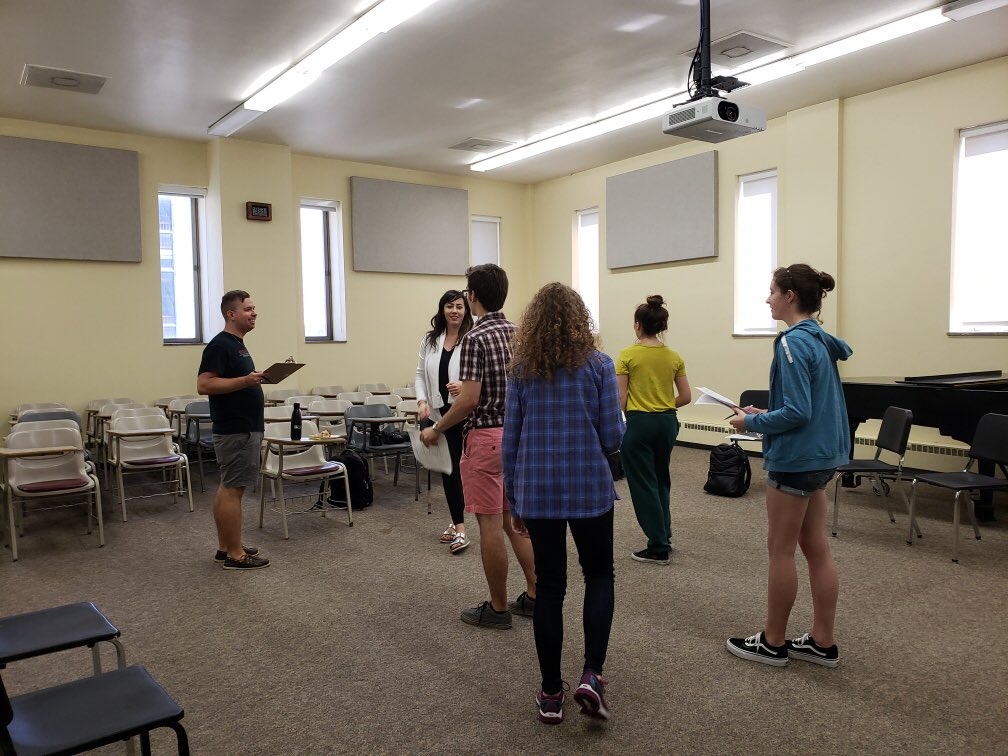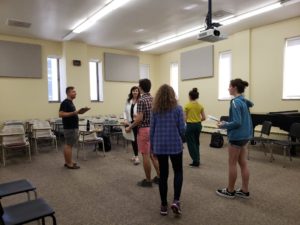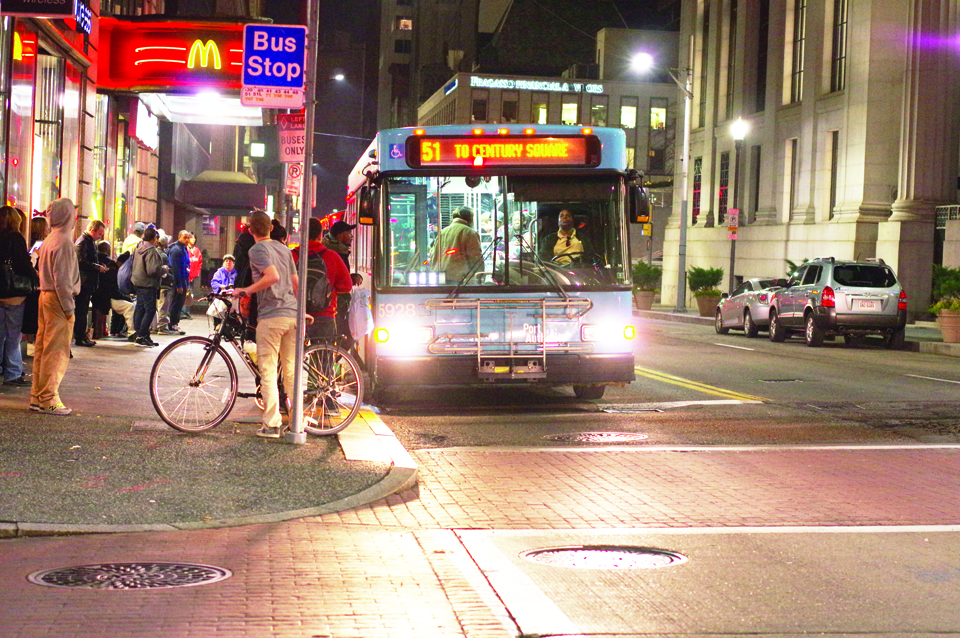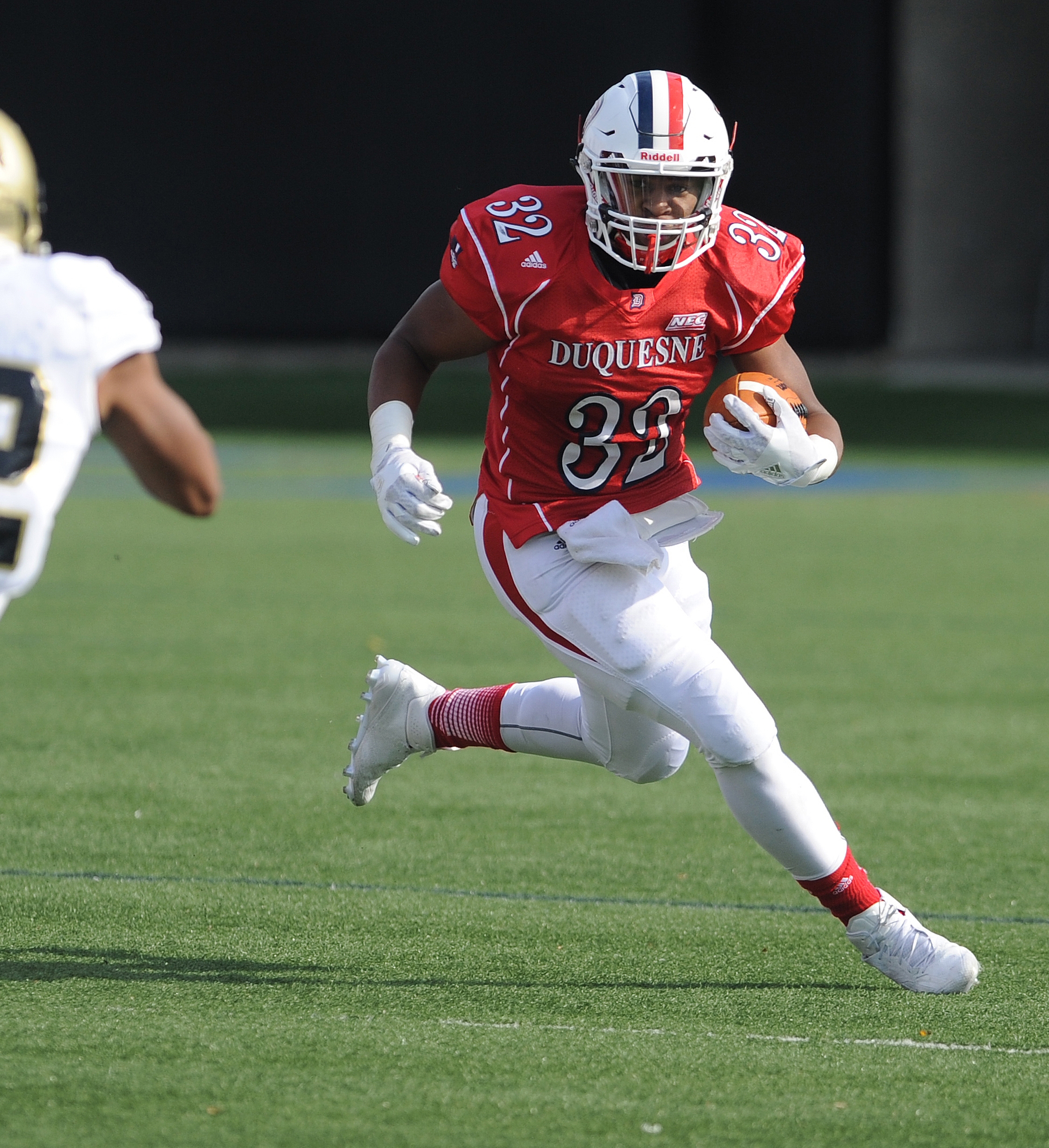

Actors frantically rehearse their scenes in the Mary Pappert School of Music, with little time to waste.
Griffin Sendek | Staff Writer
09/13/18
The 24-Hour Play Festival returns to Duquesne University, kicking off the Red Masquers’ 106th annual season. As one of the actors, I experienced this tumultuous whirlwind of a day firsthand, and I will be going through my perspective of the festival.
The festival is a tradition that began on Duquesne’s campus for the first time last year showcasing multiple plays written, directed, rehearsed and performed for an audience, all in the span of 24 hours. After an incredible amount of positive feedback from last year’s performances, two 24-hour play festivals have been added to the 2018-2019 season. As long as the interest to participate remains in the writers, directors, and actors like myself, there are plans to keep the tradition going for many years to come.
24-hour play festivals are specifically designed to not allow any work to begin until the official start time. Directors cannot think up any concepts for the kind of show they want to put on because there are no scripts yet. Writers cannot begin the script without the writing prompt. Actors are unable to prepare for roles or begin memorizing lines without knowing who their character is or what they say. Finally, the tech staff will have no idea what the directors will require. The thought of starting from scratch with only a day to complete the show is extremely daunting for everyone involved, but that is precisely what makes it more fun. Personally I often take a few days to get my lines fully memorized, so being handed the script and told to be memorize it ASAP was no easy task.
Putting on a play is a lot more complicated than simply putting actors in front of the audience and having them perform; to make any of the shows possible, a hard-working and skilled tech staff is absolutely necessary. Most productions have weeks to design and organize all of the set, lights, props, sound and costumes; this time around there were only a matter of hours to fully organize all the technical elements of the Festival for five separate plays.
Putting on five plays requires lots of people: five writers, five directors, eighteen actors and an eight-person tech staff are what made this festival possible.
Auditions were held at 8 p.m. the night before the performance. The 24-Hour Play Festival is open to all Duquesne University students and alumni, pulling in new and familiar faces alike, all with varying amounts of experience. As an actor I was asked to recite a short comedic monologue and fill out a list of skills, as well rate my ability to memorize lines on a scale from 0 to 10. The skills that I and my fellow actors listed varied from serious, such as singing, dancing and stage combat abilities, to seemingly random things such as hula-hooping. It was important to list a good number of skills, no matter how random, because any one skill could have given the writer inspiration for an entire character or plot point.
Following a short period of deliberation after auditions, all actors were sent back into the theater to find out our scene partners, as well as who would be writing and directing our shows. At this point, some of the writers already had a general picture of what the story and characters were going to be, while others were still developing ideas. For example, Tyler Jennings, the writer of my group’s play, was still bouncing around ideas, but he was able to ask our group two questions: “Are you OK with kissing on stage,” and “Do you all have booty shorts?” No one had any objections to the kiss, and there were enough booty shorts to go around, but we left the theater understandably having no idea what to expect from the finished product.
As soon as we left, the long writing process began. The writers stayed up all night to finish the final draft of their script by 7 a.m. After hopefully getting a good night’s sleep, everyone returned to the theater at 8 a.m. to have breakfast and read through the scripts for the first time. Following the first read through, there were only 12 hours remaining to get the show on its feet and ready for an audience.
Now the rehearsal process had begun, which meant that all the writers could finally catch some sleep. For my group, rehearsing began with reading through the script a few more times to get a better grasp on the story and characters. We discussed costumes briefly and it was for the most part all clothing we already owned. The only exception was a pair of gold booty shorts to be worn by the character Oliver, played by Max Begler. Begler was not the happiest about the shorts, but did not argue with the decision.
We began learning some rough blocking, getting the general idea of where everyone should be throughout the scene. The next several hours were spent working with our director, Katherine Hess, to improve and refine the show. Most often, productions have several weeks of rehearsal, allotting plenty of time for actors to be off-book; here we had under 12 hours, so almost every moment of the day the lines had to be running through my head, for forgetting my lines in front of an audience is one of my worst nightmares.
Throughout the day the tech staff made rounds to all the groups asking what set, prop, costume, light and sound elements were needed. If the directors were being too ambitious this was the opportunity to state if what the directors wanted was not possible.
My group continued to rehearse until our allotted tech run time slot. This time was just for the tech staff, giving them a chance to run all of the set changes, light and sound cues. This also allowed the directors to see what it looks like on stage, and ask for small tweaks to the tech to make it a smoother, better performance.
Following the tech runs was a short break to gather everything we needed before our first and only dress rehearsal. The dress rehearsals were the first chance we had to watch our fellow performers shows. After being so focused on my own show all day, it was incredibly entertaining and relaxing to sit back and take a moment to laugh along at everyone else’s hard work.
Exactly one day after the initial auditions, the theater was packed with audience members, and the first of five shows began. They all went off without a hitch, and the audience was alive as ever; laughter could be heard all throughout the entire theater.
The day was long but there was so much to do in so little time that it went by lightning fast. After the performance, I, and likely everyone else was completely exhausted, but for me, the 24-Hour Play Festival as such an incredible experience to be apart of. It was more than worth the exhaustion at the end.



